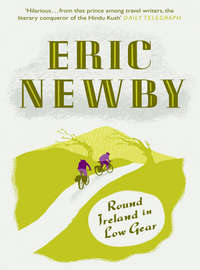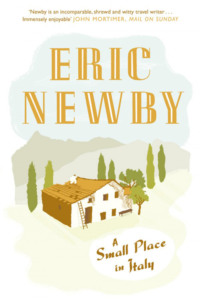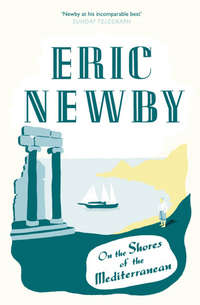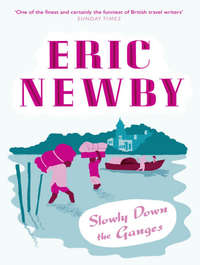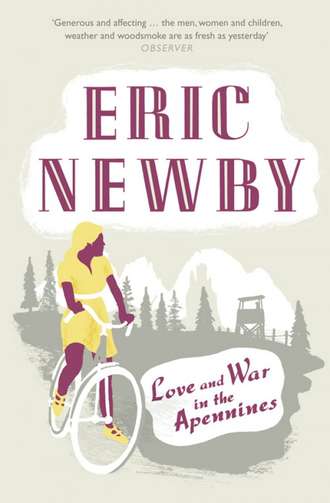
Полная версия
Love and War in the Apennines
If I had not had marginally O.K. friends who had not abandoned me when we moved to the orfanotrofio from the camp in which we had previously been imprisoned I, too, would have become a dweller in darkness, which I did not want to be. I wanted the opportunity to observe the O.K. people at close quarters and some inner voice told me, quite correctly for once, that this was going to be my last chance ever to do so in the whole of my life.
Before the war I had rarely spoken to O.K. people, let alone known any well enough to talk to. Even at Sandhurst in 1940, where I was a member of the Infantry Wing in the Old Buildings, which were so much more elegant than the New Buildings, O.K. people had been rarities. They were accommodated in the hideous New Buildings, which were not really new at all but were newer than the old ones; or else they were members of something called The Royal Armoured Wing – I now forget where they lived – which had to do with armoured fighting vehicles and therefore with what was still called the Cavalry, which was nothing to do with the Royal Tank Regiment and still isn’t, thirty years later.
When I was very young I sometimes used to see what I immediately recognised as midget versions of O.K. people in Children’s Hairdressing on the first floor at Harrods, to which my mother, who had been a model girl at the store and had a nostalgia for the place, used to take me from Barnes to get my hair cut, where they exercised themselves on the rocking horses while waiting to be given the treatment and never let me have a go. I used to see them, too, wearing hand-made overcoats with velvet collars and long gaiters with hundreds of buttons down the sides, the sort of outfit which would have caused any un-O.K. child to have a fit of apoplexy in the mild spring weather in which they were dressed like this, being pushed up Sloane Street in huge, glossy machines known as Victoria carriages, which were short-wheelbase prams with curled up fronts, like seashells, in which they travelled sitting more or less upright with their backs to whoever was pushing them and, usually, with a dark blue blanket clipped over the front with their initials, or their parents’ initials, embroidered on them, on their way to the Dell, a charming grassy depression on the far side of Rotten Row, in the Park. They were still being conveyed about in these carriages at an age when I had long forgotten what it was like to be in a push-chair, which was what I had had to make do with after my nanny had been shown the door.
The nurses who had the pushing of these little O.K. boys who sat, as it were, with their backs to the engines, were invariably bad-tempered looking and absolutely hideous. They wore porkpie hats with badges on them, long, drab overcoats of putty-coloured gabardine or grey flannel, with lisle stockings to match, and clumpy great shoes; not like my very sexy suburban nanny who wore a uniform bought for her by my mother – who had not been a model girl for nothing – a blue denim dress in summertime with stiff white collar and cuffs and black silk stockings and high-heeled shoes, and whose head was swathed in some sort of dark blue veiling when she took me out for an airing, often to have assignations with what looked to me like very old men but were probably quite young ones, in a graveyard, not in fashionable S.W.1 but in S.W.13, keeping me quiet while she did whatever she did with them by giving me handfuls of Carrara marble chippings from the tombs to play with. (She was fired when my mother found me still playing with them in the bath.) If this nanny, of whom photographs still exist in an album, which enables me to remember more clearly than I would otherwise have been able to do what she looked like, had taken me to the Dell, the other nannies would have ignored her, not only because she was far too good looking to be a nanny, but because I was not an O.K. child.
Whatever else I may have envied them I certainly did not envy these little O.K. boys their nannies.
‘Why is the sky blue, Nanny?’ I heard one ask in the bell-like upperclass voice which I envied and always wished that I could emulate – mine sounded as if it emanated from my boots. To which he got the reply, ‘Ask no questions and you’ll be told no lies, little Mr Inquisitive.’
And later when we were all a bit older, and I was on my way to or from the dentist, also in S.W.I, with my mother’s ‘Help’, I sometimes used to see a shambling crocodile of them, all wearing the strange-looking, tomato-coloured caps of a smart pre-prep school, which looked like the sort of caps that some Irish peasants still wear, being shepherded along the road by a number of brisk grown-ups, all wearing no-nonsense-from-you expressions.
‘Well-born they may be, Master Eric,’ the ‘Help’ said stoutly, when they had shuffled past, ‘but most of them look half-barmy to me.’ And when the war came and I was on embarkation leave I saw them again in Harrods, in various splendid uniforms with their mothers and sisters and girl friends who all wore miniature replicas of their regimental badges picked out in diamonds, and again listened with awe to their loud, self-confident voices, usually we were ascending or descending together in one of the lifts, slightly cracked versions of the bell-like tones I had listened to with envy on the way to the Dell sixteen years before. But this was the first opportunity I had had to consort with them and study them at leisure and en masse.
In the camp the members of the coteries moved easily in a mysterious, almost Edwardian world and when they addressed one another they used nicknames, just as the Edwardians had been so fond of doing, which were completely unintelligible to anyone else, and they knew who was who so far down the scale of the aristocracy to a point at which one would have thought that any blue blood corpuscles would have been non-existent. They alone knew that ‘Bolo’ Bastonby was the nephew of the Earl of Crake, that ‘Jamie’ Stuart Ogilvie-Keir-Gordon was the youngest brother of the Master of Dunreeking and that ‘Feathers’ Farthingdale was the third son of the Marquis of Stale by his second wife. No one outside these coteries had even heard of the holders of the titles, let alone ‘Bolo’ Bastonby, ‘Jamie’ Stuart Ogilvie-Keir-Gordon or ‘Feathers’ Farthingdale.
One interesting thing I noticed about them, and this applied to almost all of them, was that they would not tolerate any criticism by outsiders of anyone whom they regarded as being ‘one of us’, even though the person being criticised might be hundreds of miles away.
Down at the marginally O.K. end of the otherwise O.K room which I inhabited, there was an officer in a very grand regiment who was not completely accepted by the coterie because none of them knew anything about his family and because he had been commissioned from the ranks of the same regiment in peacetime, a rare thing and one that implied that he probably possessed gifts which, in such a regiment, might take him to the heights of his profession and one that most marginally O.K. and un-O.K. people in the orfanotrofio who knew about it, regarded as ‘a good thing’ or ‘a good show’. And because he was in such a grand regiment he was allowed more latitude than the average marginally O.K. resident. But one evening he went too far.
‘I think Randolph Churchill’s a shit,’ he said, in the course of a long, rambling, semi-drunken conversation about the past which had temporarily united the two ends of the room. And from the other end of it, like an echo that had somehow gone wrong, came a passionate cri de coeur from someone who – I happened to know, because he had himself told me so on a previous occasion – had never met Randolph Churchill in his life, and everyone else at his end of the room, some of whom did know Randolph Churchill well, knew it too.
‘How dare you say that! Randolph’s a personal friend of mine!’ He spoke in exactly the same voice as one of the little boys in Children’s Hairdressing in Harrods had when I tried to get a ride on the rocking horse which he had been astride ever since I arrived. ‘Go away!’ he said to me. ‘It’s my rocking horse!’
The next morning while we were out in the courtyard being counted by the Italians I asked Alastair why he had sprung to the defence of Randolph Churchill whom he had never met and might, for all he knew, be a shit.
‘I don’t care whether Randolph Churchill’s a shit or the sun shines out of his arse,’ he said, ‘I just can’t bear little men like that saying that kind of thing. Someone had to teach him a lesson. He had it coming to him.’
The ‘little man’ he was giving the lesson to was well over six feet tall.
Although some members of the coteries could be described, without irony, as being ‘cultivated’, none by the wildest stretch of the imagination could be said to be ‘intellectual’. The intellectuals in the camp, of whom there were not many, were most of them not even marginally O.K. One, who subsequently became a very successful leader of the Italian partisans, was regarded as being what they described as ‘Bolshie and odd’; not because he was not a good soldier, which they had to admit he was, but because every opinion that he held was completely at variance with their own – about the war and why it was being fought and why he was fighting it, and about the sort of Britain which would emerge as a result of it – and, most suspicious of all, he actually learned to read and write Italian while he was in the orfanotrofio.
On the whole they weren’t great readers, although we had a large library made up of books brought from other camps which had originally been sent out by the Red Cross, books from the British library in Rome and books sent by next-of-kin which were handled by the Bodleian. Books even continued to arrive, minus their covers, after an extremely inept attempt by a then highly secretive section of the War Office (M.I.9), interested in encouraging us to escape, to send us money and maps hidden inside the boards, after which every book had its covers ripped off and had to be re-bound with cardboard from Red Cross parcel boxes before it could be read.
But although not great ones for a book, few coterie men would have dared to express themselves publicly as one late arrival did, as soon as he arrived at the camp.
‘Since I’ve been captured I’ve been locked up alone for a bit and I’ve been thinkin’,’ he said. ‘I’ve decided to take up readin’ and I’ve written to Mummy askin’ her to send me the Tatler and the Book of the Month.’
In all the time I was in the orfanotrofio I can scarcely remember a moment, except when we were eating or we were being counted, or the lights were out and we were supposed to be asleep, when the rattle of dice and the shuffling of pieces on a backgammon board could not be heard. Down below in the cellars where we ate our meals, those temporarily expatriate members of White’s Club in captivity, who themselves formed a unique inner coterie, had a big table for baccarat, at which they played after the plates had been cleared away, for the kind of stakes to which they had been accustomed in St James’s Street before the war, using the letter cards which were intended to be sent to their next-of-kin as cheques which they sent to one another’s bankers on settlement days. And later in the summer, when the exercise field, from which we all admired the girls of Fontanellato on their way to the cemetery, was opened some of them used to race corks, also for big stakes, down a minute rivulet which rose mysteriously from the earth at the top end of the field, flowed briskly for a while, and as mysteriously died away. Or else they would make a book on the running races which some lunatic organised between members of the various armies which were represented in the camp.
I ran the mile for the Eighth Army, because I needed the exercise and loathed football and basket ball. And because of the form I displayed, by the day of the meeting there was a lot of money on me, mostly placed by White’s men who had been watching me during my early morning ‘gallops’.
At the beginning of the last lap I knew that I would win. I put in a tremendous spurt and romped home. Unfortunately, I had miscounted the number of laps and there was one more to go. I finished third. I was disappointed, but not nearly so much as the little group of White’s men, shoulder to shoulder, not as I have so often seen them on race courses since the war, dressed according to season or the grandeur of the event in morning coats and top hats or flannel-suited with squashy brown felt hats pulled down over their noses and always with big race glasses, philosophically marking their race cards before setting out once more for the paddock, but still shoulder to shoulder.
‘You didn’t pull it, Eric, did you?’ one of them said as I went in to change.
At the time, only having been to a couple of trotting races, I wondered what on earth he meant.
The orfanotrofio was more like a public school than any other prison camp I was ever in. If anybody can be said to have suffered in this place it was those people who had never been subjected to the hell of English preparatory and public school life; because although there was no bullying in the physical sense – canes had been taken away for the duration, and the twisting of arms was forbidden by the Geneva Convention – there was still plenty of scope for mental torment; and although the senior officer thought he ran the camp it was really run by people elected by the coteries, just like Pop at Eton, where so many of them had been.
This state of affairs continued until a very regular full colonel arrived who had not been at Eton but at Wellington and was so horrified by the lackadaisical, demilitarised state in which he found us all, that he immediately organised the camp on the lines of an infantry battalion, in companies with company commanders. Under him the orfanotrofio began to resemble the prison camp in Renoir’s Grande Illusion. It had a commandant who was a regular colonello of the ancien régime who found himself in sympathy with our colonel, who came from the same sort of background as he did.
When one of the prisoners was found to be stealing food, a most awful crime in a prison camp where everyone started off with exactly the same amount however much more they managed to acquire by exchanging tobacco and cigarettes for it, and the problem arose of punishing him without the added and unthinkable indignity of handing him over to the Italians to keep in their cells, the colonello offered our colonel a small Italian infantry bivouac tent and a piece of parched ground in what was normally a zone that was out of bounds to us on which the sun shone all day, so that the offender could expiate his crime in solitary confinement and on a diet of bread and water provided by the British, from their rations, not by the Italians.
Some of the prisoners were very old prisoners indeed, not in age or seniority but because of the number of years they had been locked up. Most of the ‘old’ prisoners had wonderful clothes which no one who had been captured later in the war could possibly emulate, things that had been sent to them before the Italians had instituted rigid sumptuary laws for prisoners of war in order to prevent anyone having anything which vaguely resembled civilian clothes. By some technicality those who already had these clothes were allowed to keep them, providing that the larger items bore the large red patches which were sewn on to everything we wore. They had pig’s-whisker pullovers, scarves and stocks from the Burlington Arcade secured with gold pins, make-to-measure Viyella shirts, and corduroy trousers, and those who were members of the Cherry-Pickers wore cherry-red trousers. Some of this gear had reached them by way of the Red Cross and neutral embassies, but not all of it. One officer had an elegant hacking coat which had been made for him while he was a prisoner, out of a horse blanket which he had rescued from his armoured car when it went up in flames near Sollum, and which he paid the Italian tailor for with cigarettes.
The one thing which united the prisoners in the orfanotrofio and which gave them, as it were, a ‘team spirit’, was their attitude towards the ‘Itis’. ‘Itis’ in the abstract, because it was difficult for any but the most hidebound to actively dislike our ‘Itis’, apart from one or two horrors who would have been horrors whatever their nationality, and we all loved the ‘Iti’ girls – soldiers always make an exception for the women of the enemy, for otherwise they would feel themselves completely alone.
The colonello was generally conceded to be ‘all right’, a ‘good chap’ in spite of being an ‘Iti’; and most people liked one of the Italian officers because he smoked a pipe and was more English than many of the English. For most of the others and the wretched soldiery who guarded us, the privates and the N.C.O.s, with their miserable uniforms, ersatz boots, unmilitary behaviour and stupid bugle calls, we felt nothing but derision. What boobs they were, we thought. We used to talk about how we could have turned them into decent soldiers if only we were given the opportunity.
How arrogant we were. Most of us were in the orfanotrofio because we were military failures who had chosen not to hold out to the last round and the last man, or, at the last gasp, had been thankful to grasp the hand of a Sicilian fisherman and be hauled from the sea, as I had been. We were arrogant because this was the only way we could vent our spleen at being captured and, at the same time, keep up our spirits which were really very low. Deep down in all of us, prisoners isolated from the outside world and Italian soldati, far from home, subjected to a twentieth-century Temptation of St Anthony and without the money to gratify it, firing volleys at us in fury because we laughed at them in front of girls who by rights should have been their girls, tormenting us all, reminding us constantly of something for which we felt that we would give up everything we had for one more chance to experience, something we ourselves talked about all the time, was the passionate desire to be free; but what did we mean by freedom? I thought I knew, and so did everyone else; but it meant so many different things to so many of us.
We were, in fact, as near to being really free as anyone can be. We were relieved of almost every sort of mundane pre-occupation that had afflicted us in the outside world. We had no money and were relieved of the necessity of making any. We had no decisions to make about anything, even about what we ate. We were certainly much more free than many of us would ever be again, either during the war or after it. And as prisoners we did not even suffer the disapprobation of society as we would have done if we had been locked up in our own country. To our own people we appeared as objects worthy of sympathy.
1 One of them was Captain Anthony, later Major-General, Dean Drummond, CB, DSO, MC and Bar, captured in North Africa in 1941 and escaped in 1942.
2 For a remarkable book on this subject, set in the orfanotrofio, see The Cage, by Billany and Dowie, Longmans, 1949.
CHAPTER THREE Armistizio
The evening of the eighth of September was hot and sultry. The hospital was a room on the piano nobile immediately opposite the wooden huts in which the Italian guards lived and in which they kept the radio going full-blast.
At about a quarter to seven, while Michael and I were lying on our beds sweating, he on his stomach because of his boil, a programme of music was interrupted and someone began reading a message in a gloomy, subdued voice. It was to the effect that the Italian Government, recognising the impossibility of continuing the unequal struggle against overwhelming superior enemy forces, and in order to avoid further grave calamities to the nation, had requested an armistice of General Eisenhower and that the request had been granted. As a result, all hostilities between the Italian and Anglo-American forces would cease forthwith. Italian forces, however, would resist attacks from any other quarter, which could only mean Germans.
The voice we had been listening to was that of Marshal Badoglio who had been head of the Italian government since the fall of Mussolini on July the twenty-fifth. Although neither Michael nor I could speak Italian we both understood what was said because, like a lot of other prisoners, we had become quite proficient in the kind of clichés which the Italian Supreme Command employed in its bulletins, and this announcement was in the same idiom. What the Marshal didn’t say in his speech was that what had been arranged was not an armistice but an unconditional surrender signed under an olive tree five days previously in Sicily, and that he had been forced to make the announcement this evening very much against his will, because Eisenhower had already done so an hour and a quarter earlier, and the B.B.C. forty-five minutes before that, in what was to prove one of the most lamentable scoops of the war (lamentable, because it gave the Germans valuable extra time in which to disarm the Italian forces before any Allied landings began).
Later that night, without having done anything to organise the resistance to the Germans which he had called on his soldiers to make, Badoglio departed from Rome for the Adriatic coast, together with the King, from where they were taken by warship to Brindisi, leaving an apathetic and utterly disorganised nation in the lurch, a state in which the Italian people had long been accustomed to be left by their rulers and so-called allies. They were now left in an even deeper mess by the Anglo-Americans who had been stupid enough to inform the Germans of their intentions.
Badoglio’s announcement provoked some mild cheers from various parts of the building and a more extravagant display of joy by the Italian guards outside our window which we watched a little sourly. We had seen and heard it all forty-five days before when Mussolini had been deposed. Then the Italians had hurled his picture out of the window, torn down Fascist insignia, defaced the notices on the gable-ends of their huts with their injunctions Credere, Combattere … and other similar nonsense, and shouted to us in Italian simplified for our benefit, ‘BENITO FINITO!’ Now they shouted ‘ARMISTIZIO!’
The only difference Mussolini’s departure had made to us was that the sentries no longer fired at the windows of the bar when we looked out of them, and our walks were cancelled. If anything, we had suffered a reduction rather than an increase in our amenities. What now roused us from our lethargy was the thought that when the Germans retreated northwards, as none of us doubted they would have to, they might carry us off with them over the Alpine Passes. ‘Like a lot of concubines,’ someone said on one of the innumerable occasions on which we had discussed the possibility.
Our friends gave us all the latest news when they came to see us later in the evening.
‘The colonel called a parade in the hall,’ one said. ‘There’s to be no fraternisation with the Itis and we’ve mounted our own sentries on the gate. A party’s just gone off to recce the country round about in case the Germans come and we have to break out. If they do the colonello says he will fight, but there doesn’t seem much chance of his having to. Airborne landings are expected at Rome and Milan, and sea landings at Genoa and Rimini. It’s really a matter of holding out for twenty-four hours at the most until our people arrive. Anyway, we’re getting your gear together and we’ve got two of the biggest parachutists in the camp organised to help Eric if we do have to get out.’
‘I wish the M.O. would hurry up and get some plaster of paris for my ankle,’ I said. ‘Then all I’d need would be a stick instead of a couple of bloody great parachutists.’
‘Pity you’re both stuck here,’ said another. ‘Someone’s done a big deal with the Itis, and the bar’s doing terrific business. The ration’s been abolished; but we’ve brought your mugs. You can have some more when you’ve finished.’
Our drinking mugs were made from big tins which had originally contained powdered milk sent to us by the Canadian Red Cross, whose food parcels, together with those from Scotland, were easily the best. Each of these receptacles held more than a pint and they were now filled with a dark brownish liquid of a sort which neither Michael nor myself had ever seen before.





